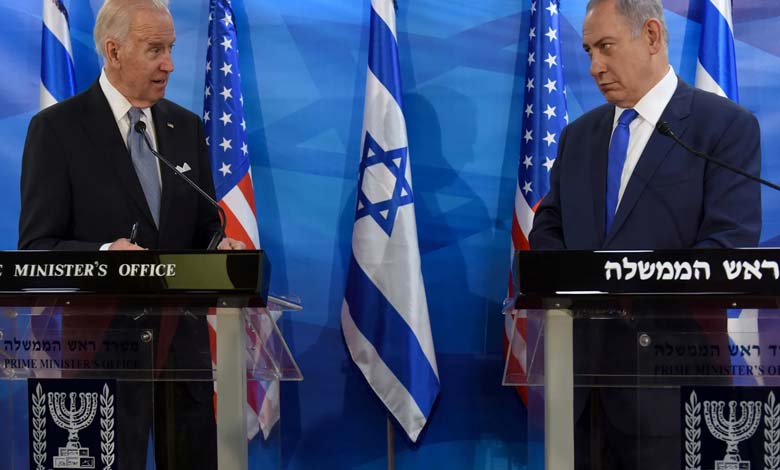Autumn Winds – 3 Factors tensioning relations between Biden and Netanyahu

The strong relationship between U.S. President Joe Biden and Israeli Prime Minister Benjamin Netanyahu at the beginning of the war on Gaza has shifted towards a square of tension, so what is the reason?
Biden was the first Western president to visit Israel after the attack on October 7th last year, where he declared his full support for the government of Benjamin Netanyahu and accelerated the flow of U.S. support in terms of arms and money towards Tel Aviv.
Moreover, Biden spoke with Netanyahu on the phone every two days, with visits of support from senior American officials to Israel continuing unabated.
However, the significant increase in the number of civilian casualties among Palestinians in the Israeli airstrikes, which Biden called “random,” on Gaza led to a decline in the momentum of these relations.
By the end of last year, disagreements began to emerge more and more between Biden and Netanyahu, to the point that American media began to report Biden personally attacking Netanyahu in closed-door meetings, including the use of vulgar language.
There are 3 developments that led to this decline in relations between the two men, whose relations are usually lukewarm and marked by many crises.
The American president wants a political horizon based on a two-state solution and seeks to reduce the intensity of Israeli aggression on Gaza and to stop Israel’s efforts to collapse the Palestinian Authority in the West Bank.
But Netanyahu does not respond positively to any of the American demands despite the continued military and political support for Israel.
American media outlets say that Biden is now paying a political price for his unconditional support for Netanyahu, as evidenced by public opinion polls for the U.S. presidential elections scheduled for the end of November.
Media reports indicate that Biden at least wants to ensure support from wide factions within the Democratic Party that do not support U.S. support for Israel in the war on Gaza.
Biden is trying to rectify this through public statements as well as pressures behind closed doors that he prefers not to make public.
In this regard, Biden said at a press conference with Jordan’s King Abdullah II at the White House last night, “The Palestinian people have also suffered unimaginable pain and losses in the past four months while the war was raging, and civilians, including innocent children, accounted for a very large proportion of those killed in this conflict, totaling over 27,000 Palestinians, including thousands of children, and hundreds of thousands cannot access food, water, or other basic services.”
He added that “many families have not only lost one person, but many of their relatives, and they cannot mourn them or even bury them due to the lack of security… It is tragic.”
The Congress Criticism
Moreover, criticism against Biden‘s support for Netanyahu escalates in both the U.S. House of Representatives and the Senate. Senator Chris Van Hollen said, “By all measures, the situation in Gaza has turned from a nightmare into pure hell.”
Hollen added in his statements yesterday evening: “I am now in the Senate chamber to discuss the urgent need for the Biden administration to hold Netanyahu‘s government accountable and deliver vital humanitarian aid to Gaza.”
As for Representative Bernie Sanders, he said today, “No one in Congress should vote to send $10 billion in military aid to Netanyahu‘s war machine when it is responsible for an unprecedented humanitarian disaster.”
He added: “Time and time again, I hear the president and members of Congress express their deep concern about Netanyahu and the humanitarian disaster he has caused in Gaza. So why do they support giving Netanyahu another $10 billion to continue his war against the Palestinian people?”
Sanders continued: “The bill gives Netanyahu an additional $10 billion in the form of unrestricted military aid for his horrific war against the Palestinian people. This is unreasonable… I will vote ‘no’ on the final passage.”
Cairo Negotiations
Biden sent CIA Director William Burns to the Egyptian capital, Cairo, on Tuesday to participate in a meeting attended by Israel, Egypt, and Qatar with the aim of reaching an agreement for a prisoner exchange and a temporary ceasefire in Gaza.
After hesitation, Netanyahu agreed to send a delegation led by Mossad chief David Barnea to the meeting, but the Israeli news site “Walla” quoted an Israeli official as saying, “We are going there to listen.”
The American news site “Axios” stated: “US officials have acknowledged that a hostage deal is the only way to reach a ceasefire, which has become increasingly important and urgent for Biden domestically, as he continues to lose support – especially among young voters – as the war persists and the number of Palestinian casualties in Gaza rises.”
Biden defended the prisoner exchange deal and ceasefire in Gaza, saying in his press conference with the Jordanian king: “It’s a deal that would achieve an immediate and sustainable period of calm in Gaza for at least 6 weeks, and we can then allocate time to build on a more enduring arrangement.”
He added, “The essential elements of the deal are on the table, and Israeli leaders have been encouraged to continue working to achieve it despite the remaining gaps, and the United States will spare no effort to achieve that.”
Military Operation in Rafah
This comes against the backdrop of Netanyahu’s announcement that he had instructed the Israeli army to prepare a plan consisting of two elements to evacuate civilians from Rafah and pursue Hamas elements.
In a phone call with Netanyahu last Sunday, Biden expressed concern about the Israeli operation in Rafah and requested that it not be carried out unless it includes a plan to evacuate civilians.
Biden said in his press conference with the Jordanian king: “The large-scale military operation in Rafah should not continue without a credible plan to ensure the safety of over a million people who have sought refuge there… Many people have fled there and fled multiple times, escaping violence in the north only to find themselves crowded in Rafah, exposed, and at risk… They need protection.”
The American president added, “We have also been clear from the outset about our rejection of any forced displacement of Palestinians outside of Gaza.”
Biden‘s statement about forced displacement comes amidst increasing calls in Israel to “voluntarily” transfer Palestinians from Gaza.
Netanyahu’s announcement of the operation in Rafah has increased concerns from Egypt, the United States, and the European Union about the displacement of Palestinians from Gaza.
Estimates indicate that there are more than 1.5 million Palestinians in Rafah, making it difficult to relocate them anywhere under the tight grip of the Israeli army on the northern and central parts of the Gaza Strip, and Israel’s refusal to allow the return of residents to what remains of their homes in the northern Gaza Strip.
Hinting at Recognition of a Palestinian State
Moreover, the United States is now hinting at recognizing the Palestinian state or at least not using the veto power in the UN Security Council against the Palestinian request for full membership in the United Nations.
The American hint comes after Netanyahu and senior officials in his government and party, Likud, announced their rejection of the establishment of a Palestinian state within the framework of a two-state solution.
Biden wants a major political agreement in the region that includes the establishment of a Palestinian state.
Biden said: “We are also working simultaneously to create the conditions for lasting peace, and we talked a lot about this during the meeting (with the King of Jordan), pointing to ensuring this peace for Israel’s security and realizing the aspirations of the Palestinians to establish a state for themselves.”
He added, “This is my long-term support for Israel… This is the only path that ensures Israel’s security in the long run. Palestinians must also seize the opportunity to achieve this.”
Biden continued, “We will continue to work together to complete what we started and integrate the region and achieve peace between Israel and all its Arab neighbors, including the Palestinian state. These efforts have been underway at full speed before the attacks of October 7th last year, and have become more urgent today.”
Netanyahu had rejected Biden‘s demands to prevent the collapse of the Palestinian Authority in the West Bank. Until now, and on the pretext of opposition from Israeli Finance Minister Tzachi Hanegbi, Israel refuses to transfer tax funds to the Palestinian Authority, making it unable to pay its employees’ salaries.
Israeli incursions into Palestinian cities and towns in the West Bank continue, undermining the confidence of Palestinian citizens in the ability of the Palestinian Authority to protect them.











